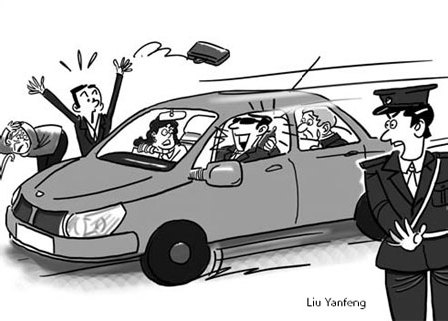
|
OPINION> Commentary
 |
|
Risks of mobile phone addiction
By Eric Sommer (China Daily)
Updated: 2008-10-17 07:52 The other day at the health club where I worked out I encountered three or four men in the change room shouting into their mobile phones. Still dripping wet from the shower, or only partially dressed, they couldn't wait to plug back into the electro-world in which people spend so much time nowadays. Shortly afterward, when leaving the club, I saw another man talking loudly into a mobile while running on a walking machine. Then, on the way out of the door, I ran into two more people - both talking excitedly on their phones while coming in and out. These health club experiences exemplify what appear to be growing addictive patterns of behavior around mobile phones in China. Addiction - simply put - is an uncontrollable compulsion to repeatedly perform a particular behavior. Alcohol, cigarettes, video games, and Web surfing are well-known areas where addiction can take hold. Now a new form of addiction - which I call "mobile phone addiction" - seems to have overtaken many people in China. The evidence of compulsive mobile phone use is all around us. Shoppers frequently interrupt their shopping; diners in restaurants interrupt their meals; and pedestrians interrupt their leisurely strolls, all to make or receive mobile phone calls. What's more, bicycle riders and motorists frequently cannot even wait to reach their destination but pick up their mobiles while driving. And large numbers of people can be seen playing with their mobile phones in idle moments when there is not even a call to make. This mobile phone addiction has serious consequences. First, like other addictions, it can render the addicts insensitive to the impact of their behavior on others around them. Mobile phone addicts frequently can be seen shouting into their phones in crowded public environments, noisily disrupting everyone nearby, when they when they could easily have waited a few minutes to call or call back after shopping or eating. Far worse, Chinese car, motorcycle, and bicycle drivers are frequently seen driving with one hand, while talking into a mobile phone held with the other. This practice is extraordinarily dangerous, because utilizing a mobile can distract the driver's attention - long enough to have an accident.  A recent study at US Carnegie Mellon University confirms the dangers of mobile use while driving. Brain-imaging technology used in the study showed a 37 percent reduction in the brain activity directed to driving tasks by mobile users. Moreover, a driving simulator used in the study showed drivers with mobile phones moving erratically out from their lanes as if drunk. Finally, like other addictions, mobile phone addiction can fragment the mind and behavior of the addict. Frequent interruption by mobile phone use can disrupt normal thought processes, and particularly those which require calm reflection or consideration. Moreover, addictive use of mobile phones can become a replacement in the addict's life for other more important activities - like reading, face-to-face socializing, solving personal problems, serious thinking, or other meaningful activities. Several corrective measures are needed to address mobile phone addiction in China. To begin with, China urgently needs to deal with the most dangerous expression of mobile addiction - mobile use while driving. Many US states including California, New York, New Jersey and Connecticut have laws restricting mobile use while driving. Mobile use by drivers has also been banned by law in China since May 2004. It's punishable with a fine up to 200 yuan, and with possible negative marks on the offender's driving record. However, the law seems to be seldom enforced. The People's Daily journalists, observing a Beijing street for 30 minutes in 2008, saw 14 drivers using their mobiles. My wife and I also frequently see motorists wielding mobiles while driving. And when traveling by taxi we frequently have to ask our drivers to put away their mobiles - so as not to endanger our lives. Clearly - given the scientifically demonstrated 37 percent drop in driving attention by mobile users - strict enforcement of the "no-mobile-use while driving" law should be a priority in China. Another key measure is to establish and enforce "no mobiles" rules in restaurants, health clubs, and other public places where people go to relax and unwind. Such rules are analogous with no-smoking rules in such environments, and are meant to increase the mental and physical health of the patrons. Offices and workplaces also need to set out clear "mobile phone use guidelines" so that the thought processes, work, and tranquility of others are not disturbed by mobile use. Finally, individuals need to also take responsibility for using their mobiles in a non-addictive manner - for legitimate personal and social phone calls, and not as a mindless replacement for meaningful life activities. Resist that urge to make or take a call when driving, eating in a restaurant, or exercising at the health club - you can call back later. The author is a Canadian teacher living in Beijing (China Daily 10/17/2008 page9) |